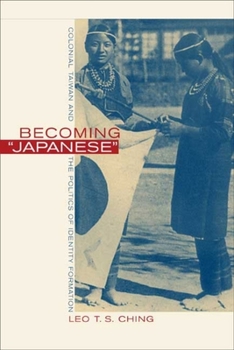Becoming "Japanese": Colonial Taiwan and the Politics of Identity Formation
In 1895 Japan acquired Taiwan as its first formal colony after a resounding victory in the Sino-Japanese war. For the next fifty years, Japanese rule devastated and transformed the entire socioeconomic and political fabric of Taiwanese society. In Becoming Japanese, Leo Ching examines the formation of Taiwanese political and cultural identities under the dominant Japanese colonial discourse of assimilation (d?ka) and imperialization...
Format:Paperback
Language:English
ISBN:0520225538
ISBN13:9780520225534
Release Date:June 2001
Publisher:University of California Press
Length:263 Pages
Weight:0.80 lbs.
Dimensions:0.7" x 6.0" x 8.9"
Customer Reviews
5 ratings
Excellent text
Published by Thriftbooks.com User , 21 years ago
A great book drawing on postcolonial and postmodern thought that analyzes Japanese colonial rhetoric about Taiwan as well as different stages of Taiwanese identity-formation under colonization. Includes an analysis of Japanese representations of aborigines, a group that is often glossed over or ignored in books on Taiwan.
The nature of colonialism and its contemporary consequences.
Published by Thriftbooks.com User , 22 years ago
This study is an excellent examination of Japanese colonialism in Taiwan and its consequences for the contemporary formation of national identity. Through examining not only the particular circumstances of Japan in Taiwan but also the nature of colonialism in general, Ching shows how colonialism is a social transformation which produces people of mixed identities. He draws upon "The Orphan of Asia" by Wu Zhuo-Liu as an example of this understanding. Ching also sets forth an interesting critique of postmodernism's hesitancy to draw judgments across cultural boundaries. The "miracle" of postwar Japan, essentially an almost immediate turn from complete external orientation to complete internal orientation and subjectivity, was made possible by the United States' appropriation of Japan's colonies and Japan's immediate alliance with the U.S. in the Cold War. Because of these factors, Japan never had to go through the harsh but important process of decolonization, and Ching shows how this failure affects the identity crisis of Taiwan today. Ultimately the book is oriented around "the politics of identity formation" in which Taiwan must come to hold a national identity which embraces the diversity of elements (Japanese, Chinese, Taiwanese, Hakka, aboriginal, etc.) that have formed the ontology of Taiwan through history.
Taiwanesness
Published by Thriftbooks.com User , 22 years ago
This is a detailed account of the Taiwanese response to colonization under the Japanese. Liu adroitly illustrates the monumental changes afoot in Taiwan of the early 20th Century and builds a strong case to support the idea of a Taiwanese identity seperate from China. Liu follows the steps colonialization drive that can later be seen in the Chinese colonization under the KMT. At times the language bogs down in anthropological terms of art, but is no less a valueable addition to the pool of information available on Taiwan.
Differences
Published by Thriftbooks.com User , 22 years ago
The Taiwanese is once a part of Japanese,but now we are the Taiwanese,uneaqual to China. China is not eaqual to Japan,so how could China be eaqual to Taiwan? To say Taiwanese = Chinese is just China's excuse to occupy Taiwan,for China feel well-developed Taiwan is a BIG FAT SHEEP for them to eat. Actually,I can say Chinese know nothing about Taiwanese traits and personailty. China would never be willing to understand it and communicate with us Taiwan,for Chinese is very self-focus arrogant people. So,to be nearset neighbor with China is the sadest fate for Taiwan. The book revealed the differences of Taiwanese and Chinese,focus on what is the life-experiecnce(historical)reasons of forming the "Taiwanese" identity. Readers can sense the logic a little from this book.
very good!
Published by Thriftbooks.com User , 23 years ago
I think it's a good book.It gave us(chinese,especially taiwanese) a lot of infromation about the history of taiwan,and the relationship between the japan and taiwan(china).It let us know more,it make us understand more.





